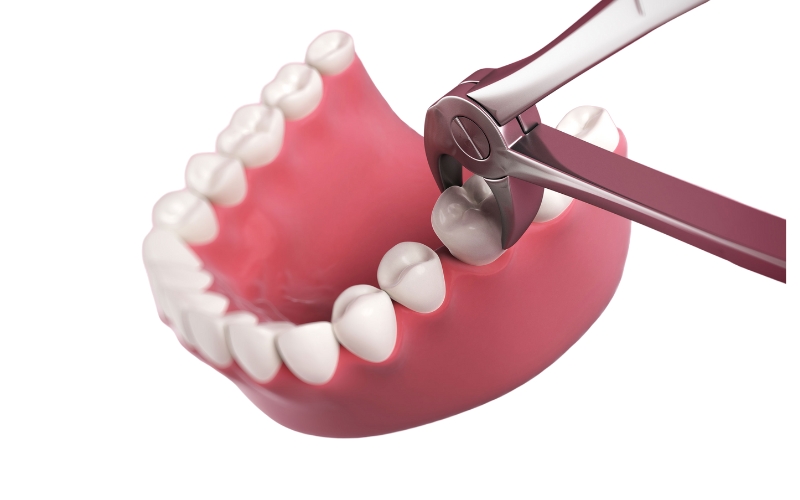
Tooth extraction is a common dental procedure that many people undergo at some point in their lives. Whether it’s due to severe decay, infection, or crowding, the removal of a tooth can lead to discomfort and pain during the recovery period. To manage this discomfort, many individuals reach for over-the-counter pain relievers like ibuprofen. However, recent research suggests that there may be better choices than ibuprofen for optimal healing after a tooth extraction. In this article, we’ll explore why avoiding ibuprofen after a tooth extraction may be beneficial for your healing process.
Why is it recommended not to take ibuprofen after a tooth extraction?
After a tooth extraction, it’s best to skip the ibuprofen. Here’s why: Ibuprofen, a pain reliever commonly used for inflammation, might hinder your body’s natural healing process. As its name suggests, a nonsteroidal anti-inflammatory drug (NSAID) like ibuprofen targets chemicals that cause inflammation and pain. While this is great for general pain relief, it can disrupt healing after a tooth extraction.
The extraction site forms a blood clot to protect the bone and nerves as it heals. This clot is vital for preventing complications like dry socket, which happens when the clot dislodges prematurely. Ibuprofen’s anti-inflammatory effects can potentially interfere with clotting, raising the risk of dry socket.
Possible Risks and Complications of Taking Ibuprofen After Tooth Extraction:
- Impaired Blood Clot Formation: Ibuprofen’s anti-inflammatory properties may hinder the formation of a robust blood clot at the extraction site, heightening the likelihood of issues like dry sockets.
- Extended Bleeding: Ibuprofen’s blood-thinning effects and inhibition of platelet aggregation can result in prolonged bleeding at the extraction site.
- Healing Delay: Interfering with inflammatory mechanisms, ibuprofen could potentially postpone or hinder the appropriate healing process following a tooth extraction.
Are there alternative pain relief options that can be used instead of ibuprofen after a tooth extraction?
While ibuprofen might not be the best choice for pain relief after a tooth extraction, there are fortunately other options available. To find the most suitable alternative for you, it’s important to consult with your dentist or oral surgeon. They can consider your individual needs and medical history to recommend the safest and most effective pain management strategy for your recovery.
Alternative Pain Relief Options After Tooth Extraction:
- Acetaminophen (Tylenol): For pain relief after a tooth extraction, consider using this non-prescription medication. It works by dulling pain signals in your brain, but it doesn’t reduce swelling like ibuprofen. Remember to follow dosage instructions carefully and consult Dr. Michael W. Gallagher a professional Metairie dentist if you have any questions.
- Prescription Pain Medication: For very strong pain, your dentist might prescribe a stronger pain reliever. These medications are only available with a prescription because they can be addictive and have side effects. Use them exactly as directed by your dentist.
- Numbing Gels: Gels with benzocaine or lidocaine can numb a specific area for short-term pain relief at the extraction site. Apply these gels directly to your gums according to the package instructions.
How long should one wait before taking ibuprofen after having a tooth extracted?
There’s no hard and fast rule about when to take ibuprofen after a tooth extraction. It depends on how complex the procedure is, how well your body heals in general, and what your dentist or oral surgeon tells you. In most cases, waiting at least 24-48 hours before taking ibuprofen is best. This gives the blood clot at the extraction site time to form and solidify, which helps prevent problems like dry sockets. But remember, your dentist knows your situation best, so follow their specific instructions about pain medication. They might have different advice depending on your individual needs.
What are some effective pain relief strategies or medications that can be used safely after a tooth extraction, if not ibuprofen?
Ibuprofen might not always be the answer for tooth extraction pain. If it’s not recommended for you, or if it can even be harmful in your case, there are other options! Your dentist or oral surgeon can suggest different pain relief strategies and medications that are safe for you. They’ll consider your specific needs and medical history to create a personalized plan to manage your discomfort after the extraction. So, be sure to talk to them about the best course of action for you.
Effective pain relief strategies:
- Apply ice packs: Apply ice packs externally near the extraction site to alleviate swelling and numbness, offering temporary pain relief.
- Prioritize Oral Hygiene: Adhere to meticulous oral hygiene routines, including gentle brushing and rinsing with warm salt water, to maintain cleanliness at the extraction site, thus mitigating infection risks and fostering optimal healing.
- Elevate Head Position During Sleep: Elevating the head while resting facilitates reduced swelling and discomfort post-tooth extraction, enhancing comfort and aiding in the recovery process.
Pain relief medications:
- Acetaminophen (Tylenol): Acetaminophen is an alternative to ibuprofen for pain relief. While effective in reducing pain, it lacks anti-inflammatory properties.
- Opioid Analgesics: In instances of severe pain, healthcare professionals may prescribe stronger opioid medications. These should be strictly administered under professional guidance due to the associated side effects and risks of addiction.
- Topical Numbing Gels: Gels containing benzocaine or lidocaine offer temporary relief from localized pain during extractions.
Pain relief options available over the counter
If ibuprofen isn’t the right choice for you after a tooth extraction, there are still plenty of safe and effective options to manage pain. A popular alternative is acetaminophen, also known as paracetamol. While it effectively tackles pain and discomfort, it doesn’t reduce inflammation like ibuprofen does. Remember to always follow the recommended dosage instructions and never exceed the maximum daily dose to avoid any complications.
1. Acetaminophen with codeine:
After tooth extraction, your dentist might prescribe a combination of medications containing acetaminophen and codeine for more substantial pain relief. While codeine, an opioid painkiller, can enhance pain management, it should only be taken under a dentist’s supervision due to the risk of dependence and potential side effects.
2. Topical numbing gels:
Another alternative for localized pain relief involves the application of topical numbing gels or ointments containing benzocaine or lidocaine. These products are directly applied to the affected area, effectively numbing the gums and providing temporary alleviation of discomfort.
Natural remedies for pain relief
Aside from over-the-counter medications, various natural remedies offer potential relief for managing pain following tooth extraction:
- Cold Compress: Applying a cold compress or ice pack to the cheek near the extraction site reduces swelling and numbs the area, temporarily alleviating pain.
- Saltwater Rinse: Rinsing the mouth gently with warm salt water multiple times daily aids in healing and diminishes discomfort by reducing gum inflammation.
- Clove Oil: With natural analgesic properties, clove oil can be applied topically to the extraction site using a cotton swab, potentially numbing the area and providing temporary pain relief.
- Herbal Teas: Chamomile or peppermint teas, known for their soothing properties, can help alleviate post-extraction pain when consumed lukewarm.
Prescription pain medications
When over-the-counter options prove insufficient, dentists may opt for stronger pain medications to ensure effective relief following tooth extraction:
- Nonsteroidal Anti-inflammatory Drugs (NSAIDs): If ibuprofen isn’t suitable, alternative prescription NSAIDs like naproxen or diclofenac can alleviate pain and inflammation effectively.
- Opioid Analgesics: In severe pain scenarios, short-term prescriptions of opioid analgesics such as oxycodone or hydrocodone might be necessary. However, these medications should only be taken under professional guidance due to their potential for addiction and side effects.
- Antibiotics: If an infection is present or suspected post-extraction, antibiotics may be prescribed to prevent further complications and ease associated pain.
For safety and effectiveness, it is crucial to consult with a trusted dentist or healthcare provider before using any medication or natural remedy post-tooth extraction.
Did you know that the best way to reduce tooth extraction pain can be found in your medicine cabinet? A study by Case Western Reserve University’s School of Dental Medicine found that ibuprofen and acetaminophen combined are the most effective way to relieve dental pain.
Managing pain and promoting healing can be enhanced by taking pain relievers such as paracetamol or ibuprofen. It is important to always read and adhere to the recommended dosage instructions provided by the manufacturer. Research suggests that ibuprofen is especially effective in reducing pain following wisdom tooth removal.
Accidentally biting or burning your tongue or lip while still numb from anesthesia is a common occurrence. To reduce discomfort, it is recommended to take ibuprofen (like Motrin or Advil) as necessary, 1-2 tablets every 4-6 hours before the numbness subsides. Sensitivity to hot, cold, and pressure after your dental treatment is a typical experience.
The study’s primary findings indicate that Ibuprofen, a common pain reliever, especially in female patients, raises the risk of developing dry socket when compared to Acetaminophen.
If you are in pain, you can relieve it by taking over-the-counter medications like Ibuprofen (Advil, Motrin), or Naproxen (Aleve). Take 200-400mg of Ibuprofen every 4 hours with food or drink. Alternatively, you can take 220mg of Aleve every 6 hours. This treatment may be necessary for several days or longer.
After surgery, there is a possibility of bleeding if the blood clot becomes loose. If you begin to experience discomfort, it is advisable to take 600-800 mg of Ibuprofen for pain and inflammation. This commonly occurs when the effects of the local anesthetic diminish.





